
Stress can lead to hair loss, acne and breakouts, and can make existing conditions like eczema and psoriasis worse. Here’s how it impacts your hair and skin and what to do about it
JUMP TO SECTION
Click the links below to jump to the relevant section:
If your skin isn’t looking its best at the moment, or your hair isn’t growing like it used to, and if you’ve spent a fortune on skincare and haircare, it might be worth considering that stress might be to blame.
Stress can affect your whole body, it can weaken your immune system, it can affect cell regeneration and it’s not great for your heart and organs.
Yet reducing stress is easier said than done.
In this guide, we explain the impact that stress has on your skin, hair and overall wellbeing.
We then explain ways you can combat it, or at least reduce it.
Note: Reducing stress to look better is just one of the benefits. Combatting stress should be a priority for your health as much as your appearance.
Before we explain what stress does to your skin and hair, it’s worth discussing what stress is and how it impacts the body. This can help you better understand the cause and not just the symptom.
Stress is a natural response that occurs when your brain and body perceive a threat, challenge, or demand. Whether the threat is real or imagined.
It’s a hangover from when we were cavemen having to deal with danger and it’s our body’s way of preparing to face a difficult situation by triggering different physiological responses.
This is known as the stress response or the “fight-or-flight” response and at the heart of this response is the release of cortisol.
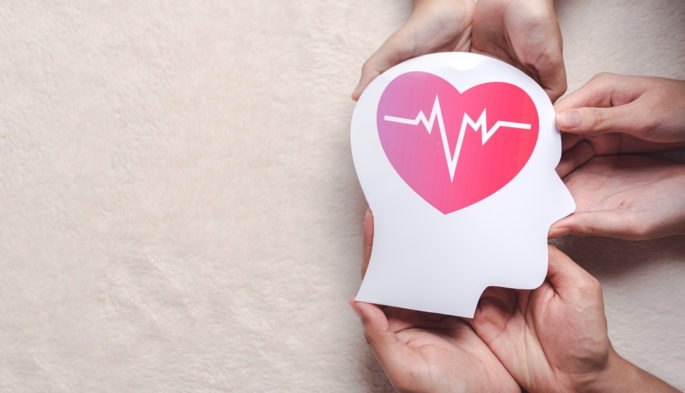 Shutterstock
Shutterstock Sorry to get technical for a second but when the brain perceives stress, it activates something called the HPA axis, which is officially known as the Hypothalamic–pituitary–adrenal axis.
This is your body’s central stress response system. When the HPA axis kicks in, it causes your body to release various hormones, including one called cortisol, from the adrenal glands.
Cortisol is also known as the “stress hormone” and it causes all sorts of effects from increasing your blood sugar level to suppressing the immune system.
You need more blood sugar to feed your brain and body and when you become stressed, your body thinks you’re about to fight something or someone so it releases cortisol to make sure you’ve got a steady supply of energy to the brain and muscles.
By suppressing your immune system – which might seem counterintuitive – cortisol is effectively suppressing your body’s inflammatory response.
During times of stress, the body triggers an inflammatory response. It believes that it has to ramp up the immune system because the body is about to be hurt. Either physically or from pathogens or similar.
Cortisol helps balance this reaction. It then helps the body prioritise resources to deal with the changes your body goes through when it senses threats or challenges.
For example, when you’re stressed your heart rate goes up and your breathing becomes faster. Cortisol helps your body direct energy and resources to respond to these changes, but in doing so it needs to take the resources from somewhere else.
It can also store this energy for fuel in case you need to fight.
Finally, by suppressing the immune system response, cortisol can stop inflammation – which is the body’s natural way of defending against pathogens and repairing tissue damage – from getting out of control. A little bit of inflammation is good for you; too much can cause serious health problems.
In the same way, a small amount of stress won’t do your body too much harm. It’s when it feels like it’s in a constant state of fear that things get out of control.
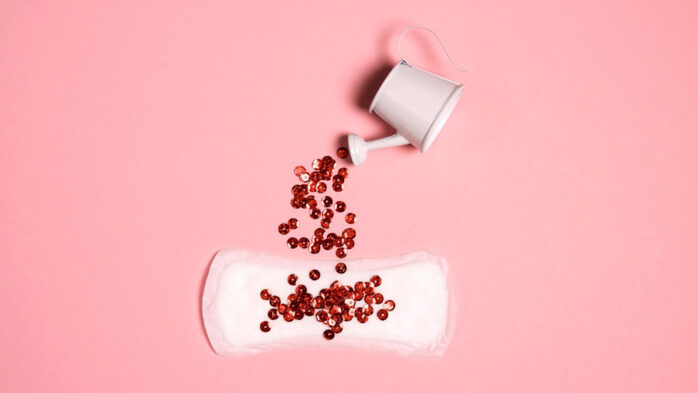 Shutterstock
Shutterstock This is a particular issue in women due to cortisol’s relationship with progesterone.
As you can read in our guide to how your skin and hair changes at every stage of your menstrual cycle, progesterone is the hormone that causes the breakdown and shedding of the womb lining which results in bleeding.
Progesterone also plays a role in how much sebum your body produces and some women experience something called progesterone dermatitis which is an eczema-style rash caused by a reaction to the higher levels of progesterone. This can lead to a rash and itchy skin.
On its own, progesterone has additionally been shown to have a “depressant” effect, which causes low energy, anxiety and low mood.
What’s most relevant in the discussion around stress is the fact progesterone is a precursor to cortisol. As cortisol is released, and especially if the cortisol levels remain high over a period of time, it can cause your baseline level of progesterone to drop.
This not only means that you’ll suffer from all the skin conditions and impacts that low progesterone generally, but when your period arrives you may find your symptoms are extreme.
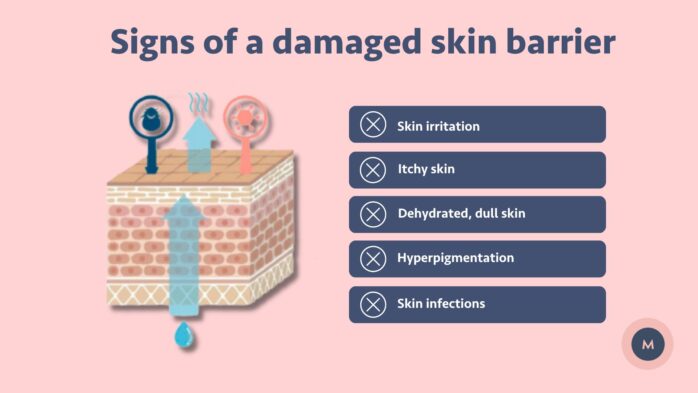 Shutterstock/mamabella
Shutterstock/mamabella Even though inflammation is a part of our bodies’ natural fight against infection and injury, chronic stress can cause this inflammation to get out of control. This can make skin conditions such as psoriasis, eczema, and rosacea flare up and get worse.
This is because stress can cause what’s known as “neurogenic inflammation” in the skin, through the release of neuropeptides and neurotransmitters from nerve endings. This type of inflammation can lead to itching, redness, and other symptoms.
This inflammation can also break down collagen and elastin. These proteins give the skin its firmness and elasticity, which is why stress can lead to premature ageing.
Elsewhere, stress can:
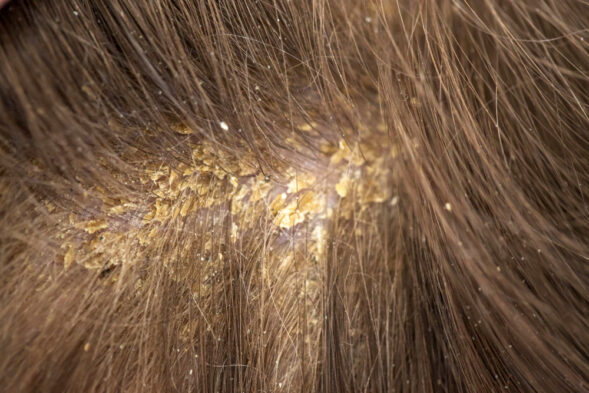 Shutterstock
Shutterstock Considering your scalp is skin, meaning it’s affected in the same way as the skin on your face, many of the impacts mentioned above can lead to hair problems too.
What’s more, the impact that stress has on your hair can range from minor problems to more serious conditions.
The everyday hair concerns that you may be caused by chronic stress include:
More serious hair problems that have been linked to stress include:
This is one of the most common stress-related hair conditions and is a fancy name for hair loss and thinning.
High levels of stress hormones can slow down or disrupt the normal cycle of hair growth. Normally, hair cycles through three phases: growth (anagen), transition (catagen), and resting (telogen).
Under normal circumstances, most of your hair is in the growth phase at any one time. Only a small percentage is in the resting, telogen phase and when it reaches this phase, it eventually falls out to make room for new hair.
When you’re stressed, and particularly when you’re stressed for a long time, the release of cortisol can put a higher percentage of your hair into the resting phase prematurely. After about three to four months in this telogen phase, these hairs begin to fall out in larger amounts than usual.
This leads to noticeable hair thinning and increased shedding. The good news is that telogen effluvium is usually temporary, and hair growth can return to normal once stress levels drop or return to normal.
FURTHER READING: Women’s hair thinning: Expert tips on how to stop or regrow thinning hair
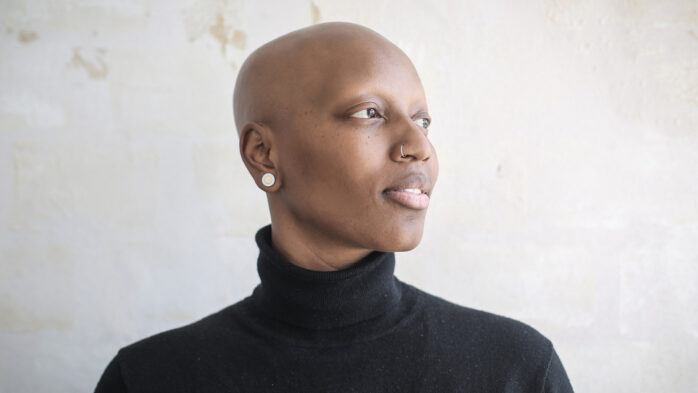 Getty Images/iStockphoto
Getty Images/iStockphoto Alopecia areata is an autoimmune condition that can be brought on by severe stress.
In people with alopecia, their immune system mistakenly attacks the hair follicles. This can slow down or stop hair growth and cause hairs to fall out. Typically in small, round patches on the scalp.
Stress isn’t the only cause but it’s believed to be one of the factors that can trigger or more alopecia areata worse. Treatment options are available, but the course of the condition can be unpredictable, with hair possibly regrowing and falling out again.
Trichotillomania, also known as hair-pulling disorder and trich, is a psychological condition and compulsive behaviour in which people feel compelled to pull their hair out. Often as a way of dealing with negative or uncomfortable feelings such as stress, anxiety, boredom, or frustration.
This includes the hair on their head, but also their eyelashes and eyebrows.
Trichotillomania is more about the psychological need to relieve stress than a direct physiological effect of stress on hair follicles, but it’s still a symptom.
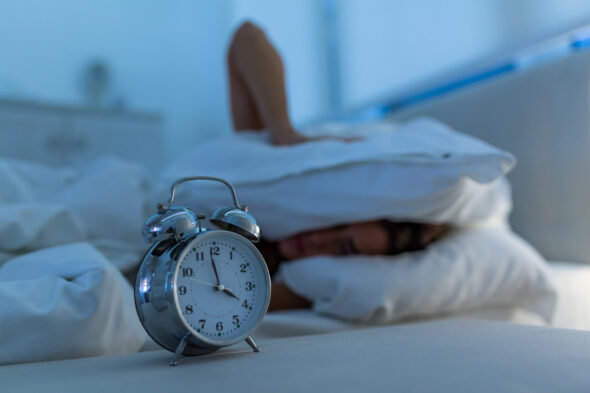 Getty Images/iStockphoto
Getty Images/iStockphoto The best way to improve your skin and hair, if your concerns are caused by stress, is to reduce the stress. However, as someone who suffers from chronic stress, this is easier said than done.
Below are some tips that can help reduce and combat stress generally. We’ve explained more about the specific skin and hair treatments and remedies further down this page.
We also want to give a shout-out to the Acne Clear Now supplement. Designed specifically to help women with acne, the supplement has a host of additional benefits including helping to regulate your progesterone levels. Since taking this supplement, not only has our skin looked better – less redness, fewer breakouts – but our period symptoms have been reduced, and we feel more calm.
The supplement isn’t cheap (£35 a month) but in our view, it’s been worth the investment. You can read more in our Acne Clear Now review.
All of the recommendations above are longer-term solutions to reducing stress generally. However, if you’re currently experiencing skin and hair problems because of stress and you want more immediate help, try the following:
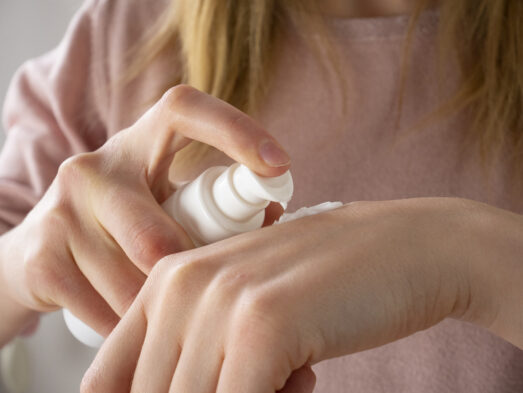 Getty Images/iStockphoto
Getty Images/iStockphoto The first step is to strip back your skincare routine and take it back to basics. This is because stress can make your skin more sensitive, increase redness and irritation, and lead to allergies.
Opt for a gentle cleanser, hydrating serum, and soothing moisturiser. It’s also worth gently exfoliating once a week too.
Prioritise products that contain:
We recommend the following products.
We also highly rate the Faace Skincare line because it sells products based on the skin concern, rather than by ingredients. This includes the Stress Faace Mask.
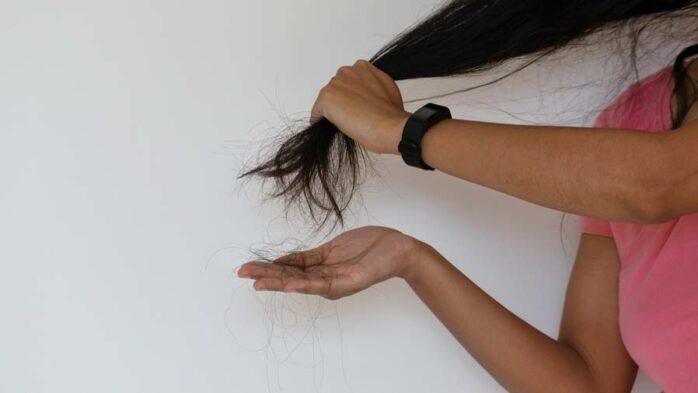 Shutterstock
Shutterstock If you’re experiencing hair loss or hair thinning and it’s a particular concern we recommend speaking to your GP or a specialist in case it’s a sign of something bigger. Other things you can do include:
You can read more in our guide on how to protect your hair from pollution.
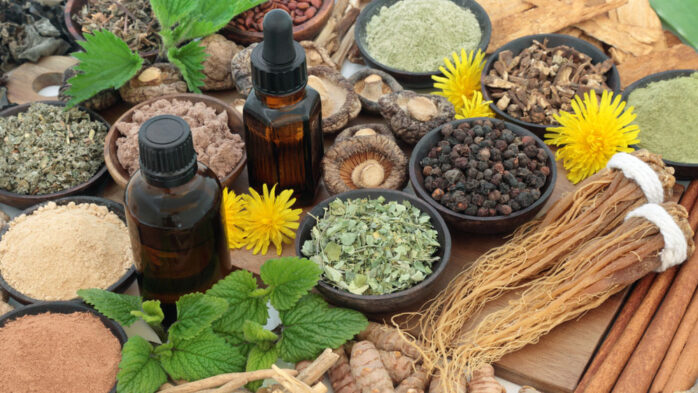 Shutterstock
Shutterstock While the research is still in its infancy, there is also a school of thought that says adaptogens and adaptogenic skincare can help manage the symptoms of stress.
Adaptogens are plants and mushrooms that are said to have “unique properties related to helping the body adapt to fight physical or mental stress and restore balance.”
They work to reduce the negative reactions that take place when our bodies are under stress and have been gaining popularity for their potential benefits in balancing people’s moods.
While they may not directly “settle the mood” like a medication, adaptogens are claimed to support the body’s natural ability to adapt to stress and have been shown to indirectly contribute to improved mood and skin health.
The studied range of benefits (so far) includes:
And they’re said to do this by:
It should be noted that while there is some preliminary research suggesting these benefits, the scientific evidence remains limited and inconclusive. The exact mechanisms by which adaptogens work are also not fully understood. More research is needed to fully understand their effectiveness and long-term safety.
You can read more in our Adaptogenic Skincare guide, or read our explainer on one of the most popular adaptogens, ashwagandha.

Victoria is founder and editor-in-chief of mamabella, freelance journalist and Mum. She has a passion for empowering people to feel beautiful whatever their age, size, skin type and budget

